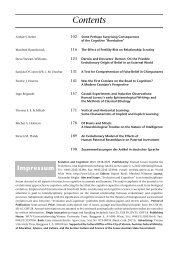Chris MacDonald<strong>Evolutionary</strong> EthicsValue, <strong>Psychology</strong>, Strategy and Conventions1. Introduction<strong>The</strong> purpose <strong>of</strong> this paper 1is to present an example<strong>of</strong> what moral theorywould look like if it tookevolutionary theory seriously.In it, I strive toavoid the errors to whichso many previous attemptshave succumbed.If I succeed in doing so, itis because <strong>of</strong> my intentmerely to show how DAR-WINIAN thinking improvesthe empirical basisupon which we constructmoral theories. At nopoint do I try to derivefoundational moral valueseither from nature inthe broadest sense orfrom the process <strong>of</strong> evolutionitself. My project isbased on the widely-held assumption that moral decisionmaking requires both values and facts. Knowinga bit about evolution can help make it clear whatthe relevant facts are. Here, I do not intend to discussbiological evolution in particular, but evolution inthe broadest sense. Evolution takes place whereverthere is variation, replication, mutation, and differentialsurvival according to inherited traits. Thusevolutionary theory applies to (at least) biologicalorganisms, certain computer programs, cultures,and ideas.At the heart <strong>of</strong> my project lies the claim that moralstandards are the products <strong>of</strong> biological and culturalevolution. Biological evolution has given us brainscapable <strong>of</strong> certain cognitive tasks, and capable <strong>of</strong>manifesting certain emotions. On top <strong>of</strong> this biopsychologicalsubstrate, cultural evolution has builtAbstract<strong>The</strong> purpose <strong>of</strong> this paper is to present an example <strong>of</strong>what moral theory would look like if it took evolutionarytheory seriously. First, I examine briefly the implicationsthat accepting evolutionary theory has forvalue theory. Secondly, I suggest that an evolutionaryperspective can shed new light on moral psychology.Finally, I suggest that an evolutionary perspectiveclears the way for a moral perspective that focuses onthe function and development <strong>of</strong> HUMEAN social conventions.I strive to avoid the errors to which so manyprevious attempts at grounding ethics in evolutionhave succumbed. If I succeed in doing so, it is becausemy intent is merely to show how DARWINIAN thinkingimproves the empirical basis upon which we constructmoral theories. At no point do I try to derive foundationalmoral values either from nature in the broadestsense or from the process <strong>of</strong> evolution itself.Key wordsEthics, convention, psychology, function, game theory.Evolution and Cognition ❘ 98 ❘ 2001, Vol. 7, No. 1a wide range <strong>of</strong> particularnorms and conventions.<strong>The</strong> field <strong>of</strong> ethics can beinterpreted as being devotedto influencing thecourse that the evolution<strong>of</strong> these norms and conventionstakes.<strong>The</strong> basic claim <strong>of</strong> thispaper is that attention toevolutionary theoryshould have two mainconsequences for moraltheory. First, attention toevolutionary theory (as itapplies to ethics) shoulddraw attention to the field<strong>of</strong> evolutionary psychology,as a way <strong>of</strong> enrichingour understanding <strong>of</strong>moral psychology. Secondly,it should draw ourattention to the study <strong>of</strong>social conventions, understoodas regularities <strong>of</strong> behaviour, sustained by ashared interest in coordination and an expectationthat others will cooperate.Why social conventions? To begin with, asGAUTHIER (1991, p18) argues, we no longer acceptthe world-view upon which absolutist conceptions<strong>of</strong> morality depend. 2 Thus we no longer have accessto plausible notions <strong>of</strong> inherent and intrinsic valueupon which to base ideal moral codes. 3 An evolutionaryview can only be founded on a subjectiveand relative theory <strong>of</strong> value. 4 Such a value-theoryleads us to ask what moral rules—what social structures—wouldaid in the pursuit <strong>of</strong> whatever it is thatwe value. 5 What moral rules have we agreed upon,and what moral rules could we agree upon, in pursuit<strong>of</strong> what we want? That is, the evolutionary perspectivemust lead us to focus on the extent to which
<strong>Evolutionary</strong> Ethicsmorality is a useful human construct, a necessaryartifice.Our second reason for paying to attention to conventionsis that an evolutionary perspective forcesus to take an explicitly historical view <strong>of</strong> our moralstandards. Much <strong>of</strong> moral theory is weakened by theextent to which it fails to appreciate the importance<strong>of</strong> considering moral agents as historically and sociallysituated. Moral theory mistakenly assumes, forthe most part, that agents (or societies) are in a position<strong>of</strong> radical choice vis-à-vis their moral principles,or more generally, their social arrangements. Attentionto social conventions—actual, existing, workingbits <strong>of</strong> cooperative behaviour—is a way <strong>of</strong> takingseriously the moral work already done by culturalevolution.2. ValueWe begin by looking at the implications <strong>of</strong> evolutionarytheory for value theory. <strong>The</strong> most fundamentalshift that an evolutionary perspectivebrings about—or should bring about—in ourunderstanding <strong>of</strong> value lies in the undermining <strong>of</strong>what RACHELS (1990) calls the ‘Human Dignity <strong>The</strong>sis’.According to the Human Dignity <strong>The</strong>sis,humans have special value not shared by nonhumannature; also according to the <strong>The</strong>sis,humans have this special value just by beinghuman, which implies that all human lives havethis value to some extent or another. Both <strong>of</strong> thesevalue claims have wide-reaching implications forethics. But, according to RACHELS, an evolutionaryperspective casts doubt upon the two claims that hecalls the ‘twin pillars’ holding up the Human Dignity<strong>The</strong>sis. First, the acceptance <strong>of</strong> evolutionarytheory renders unnecessary (as an explanatoryhypothesis) the Western religious claim thathumans were made in the image <strong>of</strong> God. Secondly,in situating humans on a developmental spectrum<strong>of</strong> cognitive capacities, as creatures with capacitiesdifferent in degree but not in kind from other animals,evolutionary thinking undermines the secularclaim that humans are <strong>of</strong> special value onaccount <strong>of</strong> their unique rationality.Although the theory to which, I argue, the evolutionaryperspective drives us is the theory <strong>of</strong> valueassumed by our most well-developed social science—economics—itis also a theory <strong>of</strong> value that isat odds with most modern moral theories. A full theory<strong>of</strong> value is beyond the scope <strong>of</strong> this paper, butthe basics—borrowed from David GAUTHIER’s account<strong>of</strong> value—can be stated briefly. <strong>The</strong> value theoryto which an evolutionary perspective drives us isone that holds that all value is dependent upon theaffective relationships <strong>of</strong> the individual, and is thereforeboth subjective (as opposed to objective) andrelative (rather than absolute).First, that value is subjective means that the ascription<strong>of</strong> value is taken to be attitudinal, not observational(GAUTHIER 1986, p25). That is, a thing’sbeing valuable depends upon some sentient beinghaving a positive attitude toward it. GAUTHIER(1986, p46) puts the point quite simply: “Value… isa measure <strong>of</strong> preference”. Thomas HOBBES is perhapsthe classic exponent <strong>of</strong> the subjective view <strong>of</strong> value.HOBBES (1985, p24) writes, “For these words <strong>of</strong>Good, Evill… are ever used with relation to the personthat useth them: <strong>The</strong>re being nothing simplyand absolutely so; nor any common Rule <strong>of</strong> Goodand Evill, to be taken from the nature <strong>of</strong> the objectsthemselves; but from the Person <strong>of</strong> the man”. Forthe value subjectivist then, nothing is ever valuablesimpliciter; it is always valuable to someone. Accordingto GAUTHIER (1986, p56), we should decide“whether any adequate account <strong>of</strong> our experienceor environment must refer to objective value” byconsidering “whether any reference to objectivevalue occurs in the best explanation we can providefor our actions and choices” (emphasis original).<strong>The</strong> value objectivist, according to (GAUTHIER 1986,p55) “…holds that any adequate account <strong>of</strong> our experienceor our environment must refer to value orto the valuable as being independent <strong>of</strong> sentient beingsand their affections”. GAUTHIER suggests insteadthat “…the only serious candidate for an explanatoryschema for human action is… [oneaccording to which] choice maximizes preferencefulfilment given belief. Objective value plays no rolein this account” (p56). GAUTHIER continues: “Objectivevalue, like phlogiston, is an unnecessary part <strong>of</strong>our explanatory apparatus, and as such is to beshaved from the face <strong>of</strong> the universe by OCKHAM’srazor”.I would argue that objective value died (or at anyrate, should have died) in 1859, with the publication<strong>of</strong> DARWIN’s <strong>The</strong> Origin <strong>of</strong> Species. DARWINIAN theorypulls down the two supporting pillars <strong>of</strong> the HumanDignity <strong>The</strong>sis. Under the scientific world-view withwhich we are left, objective value is simply an unnecessaryexplanatory hypothesis.On the theory <strong>of</strong> value to which evolutionarythinking drives us, not only is value to be taken tobe subjective, but it is also relative. On the relativeconception <strong>of</strong> value, according to GAUTHIER (1986,p50), “…each person has his own good (and bad),Evolution and Cognition ❘ 99 ❘ 2001, Vol. 7, No. 1








